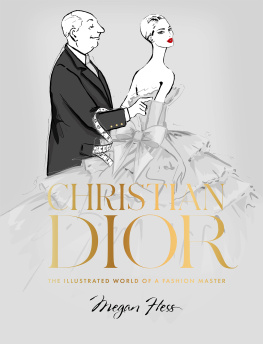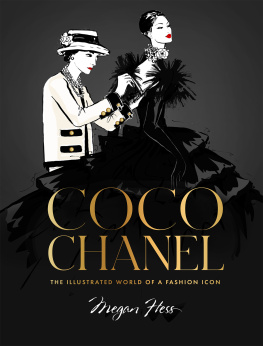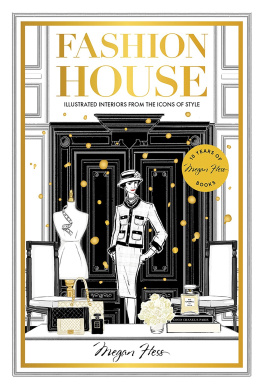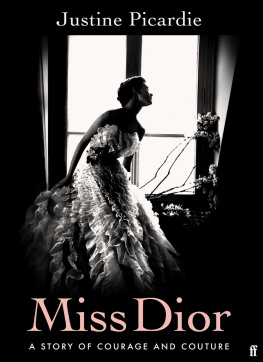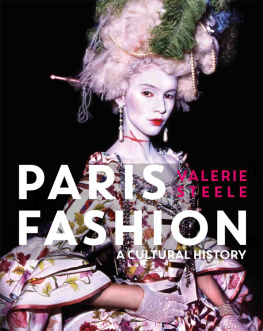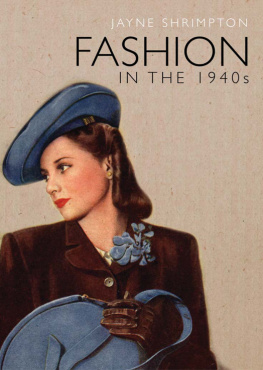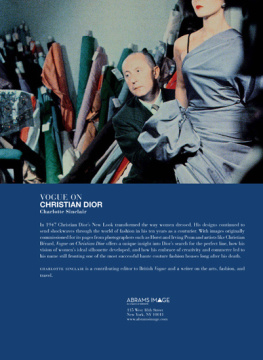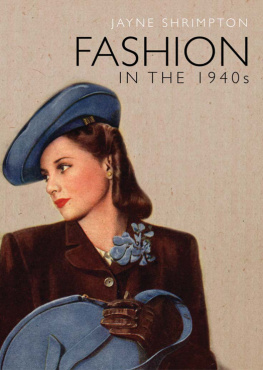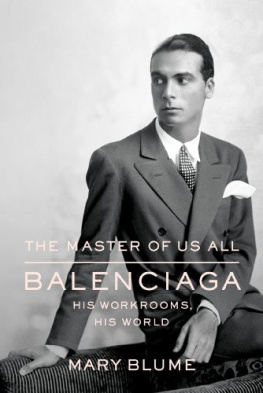For Janice Hess, my mother.

Just like Dior, your enormous heart has led you through life.
The name Christian Dior is synonymous with fashion. The man who spawned the New Look, the classic Bar Suit and the Miss Dior fragrance revolutionised the way women dressed in the 1940s and 50s, becoming one of Frances most famous sons in the process.
A RELATIVELY LATE BLOOMER, DIOR burst onto the fashion scene in 1947 aged forty-two, but he quickly became one of the most influential couturiers the world has ever seen. He conceived of silhouettes that paired creative vision with technical precision and his designs were the height of feminine opulence.
As a designer, Dior sold a dream of complete extravagance and beauty, but in fact he was no stranger to poverty and pain.
Born into a wealthy family during a golden era for France, Dior led a remarkable life punctuated with ups and downs from the Great Depression and two world wars, to family tragedy and illness. Through his experiences of hardship and austerity, Dior never lost sight of the importance of creativity and elegance.
A private man who stood reluctantly in the spotlight and was intensely superstitious, Dior was also an astute businessman. He took his designs from a small workshop in the heart of Paris and created a vast enterprise with an international audience within the space of just a decade.
Even today his legacy is almost unrivalled. The Christian Dior spirit has endured for over seventy years under the guidance of the six incredible designers who have succeeded him. Each of them has left their own mark on the brand and ensured the name Dior remains at the very heart of style.
It is time to discover a truly extraordinary man who lived through one of the most tumultuous times in history and changed the course of fashion forever.



CHRISTIAN DIOR THE COUTURIER was a creative sensation, the head of a global company and one of the most celebrated designers of the twentieth century. But Christian Dior the man was much more reserved and private than his public persona would suggest.
Born into a wealthy family during a period of prosperity in France and living through huge upheaval in his younger years, he spent most of his life in relative anonymity.
Though it was written in destiny that he would become a huge success, Dior didnt make his mark in the world of couture until he was forty-two. It took a lifetime of experience and some remarkable friendships before Christian Dior would become the couturier we know today.
Christian Dior was born on 21 January 1905 in Granville, Normandy, the second of five children in a well-off family.
His mother and father, Madeleine and Maurice, owned a successful fertilizer business that provided them and their children, Raymond, Christian, Jacqueline, Bernard and Catherine, a comfortable life.

The Dior family home was Les Rhumbs, a grand villa perched on top of cliffs facing out across the sea to the Channel Islands. The house, with its classic Anglo-Norman styling and colour palette of soft rose pink and grey, would be hugely influential to Christian over the years.

Young Christian was a dreamer. He spent an idyllic childhood in Granville under the loving eye of Madeleine, an avid gardener who transformed the windswept grounds of Les Rhumbs into an English-style garden filled with roses and lilies of the valley.
Christian adored his elegant mother and embraced her love of flowers.
He could often be found working alongside her in the garden.



Christian would also spend hours in his own world, reading books or learning the names of flowers from horticultural catalogues, or sitting in the warmth of the linen room in the company of the women who would sing as they worked.
To him, these were the happiest times of his childhood.

When Christian was five, the Dior family moved to an apartment in the 16th arrondissement of Paris.
It was 1910 and the final days of the Belle poque.
This flourishing period of creativity left a mark on the young boy as he absorbed the energy of a city bursting with optimism, elegance and progress.

In 1914, these happy times would come to an abrupt end with the arrival of World War I.
As the gloom of war descended over Paris, the Dior family was holidaying back at Granville.
They would remain at Les Rhumbs for the duration of the conflict, finding a safe haven in the tranquil, protected paradise.

It was during this time Dior had his first encounter with a clairvoyant. He was working at a charity fair for soldiers in Granville when a palm reader offered to tell his fortune.
She gave an incredible prediction: You will be penniless, but women will be good to you and it is thanks to them that you will succeed. You will make large profits and be obliged to make numerous crossings.
The Dior family was still in possession of a sizable fortune and, despite the war, had little inkling of the tough financial times around the corner. The teenaged Christian, moreover, wasnt known for his adventurous spirit. There was little chance hed be travelling across the globe.
The encounter sparked something in Dior all the same. He would never forget the prophecy.

When the war was over, the Dior family moved back to Paris and Christian dreamt of pursuing a career in architecture. Instead, he was pressured by his family to study political science.
Madeleine and Maurice Dior were keen for their second son to be a diplomat and wouldnt support his more creative pursuits.

